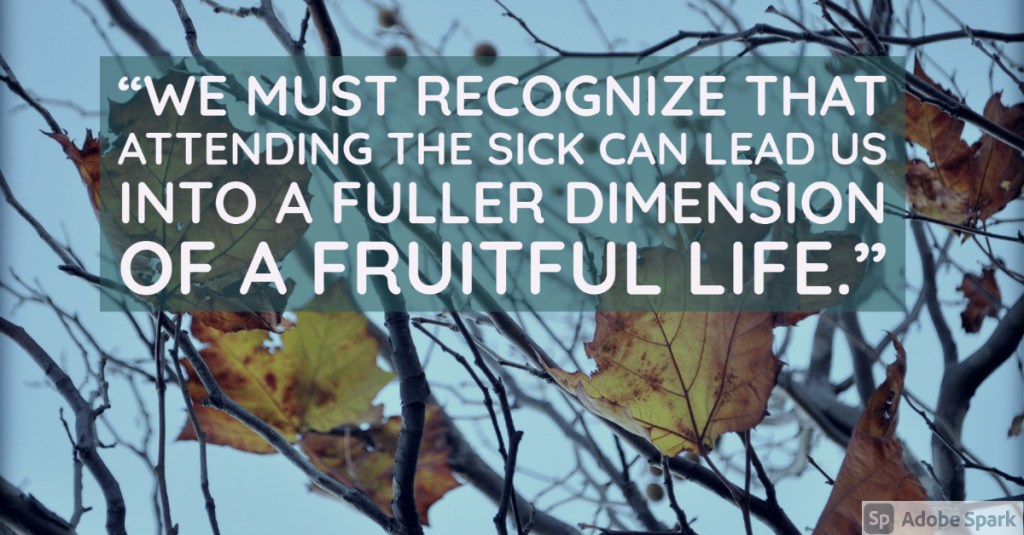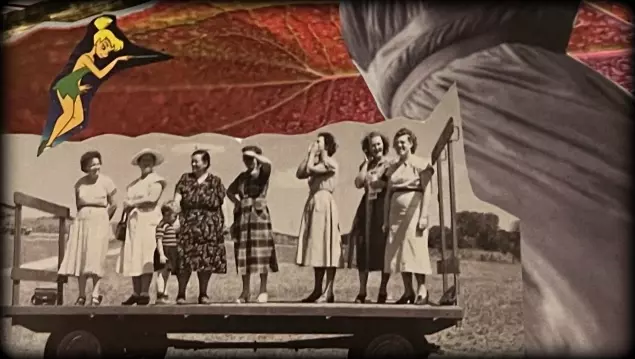November 2021 Lectio Divina and Oblate Reflections
Sources: Lectio Divina, Mark 10:35-45
Book Discussion, Always We Begin Again by John McQuiston II, “Service”, page 53-54
Morning prayer
Saint of the Day: Francis Xavier Cabrini is a beautiful example of service to others and service to God. She humbly comforted the sick and infirm in the hospital and lent a helping hand to immigrants. She is a role model for our topic of service. For more information about Mother Cabrini.

Lectio Divina Reading: Mark 10:32-45


Discussion
You do not know what you are asking. Can you drink the cup that I drink or be baptized with the baptism with which I am baptized?”
On their way to Jerusalem, Jesus shares with John and James what will inevitably happen to him. They certainly do not understand what they are requesting, to share in the glory of Jesus, and they do not want to believe that Jesus’ life will include suffering. “Grant that in your glory we may sit one at your right and the other at your left.” We must ask ourselves: Can we drink from the chalice that Jesus drinks? Or are we driven by ego, desiring the glory and honor for ourselves? Can we really DO life as Christ did? We may desire a journey with Jesus, the choice seat with God in glory and honor, but are we ready to face great suffering that accompanies it?
This applies to any part of our prayer life when we seek to follow Christ. We don’t know what we are in for! We must put ourselves wholly in the presence of Christ and be there for whatever happens–thy will be done. In the popular Christian song, Lord of the Dance, James and John are featured because they responded to the call of the Lord. With each passing verse, from morning to Sabbath to Good Friday, Jesus is the “Lord of the Dance.” We are called to that dance as well, as James and John were—we will have suffering. We are part of the dance, even when we find it difficult to consider the other first, to be more forgiving than self-centered, to accept that we aren’t just here for ourselves but to be of service to others.
Dance, then, wherever you may be,
I am the Lord of the Dance, said he,
And I’ll lead you all, wherever you may be,
And I’ll lead you all in the Dance, said he
Lord of the Dance, Ronan Hardiman

We are not in a good place spiritually when we are telling God what should be done, that we know what is best, our own power and glory. Bishop Barron addresses James and John’s ego-driven request in a Sunday Sermon, “Do You Really Want What God Wants?” Power and honor in themselves are not bad, but the problem is using power, not for God’s purpose, but for our own ego. Honor for its own sake is not helpful to others. Jesus flips the story on James and John…it isn’t all about you! You are here to serve. That is the dance you are called to.
Rather, whoever wishes to be great among you will be your servant; whoever wishes to be first among you will be the slave of all. For the Son of Man did not come to be served but to serve and to give his life as a ransom for many.”
Jesus came to serve, to give his life. The apostles did not want to hear that he would have to suffer. The center of our life is that we serve each other. Jesus came to serve, to do the will of his Father even including death on the cross. An attitude of service can help us do our jobs in the workplace and the necessary, but mundane, tasks at home.
“The use of goods and talents primarily for oneself in invompatible with humility. Humility is the key that unlocks the universe. Living life as if the pursuit of goods and recognition is its purpose, destroys it.”
Always We Begin Again by John McQuiston II
Effective leaders have a moral obligation to be of service. Leading is humbling. We must watch our own judgment, sense of entitlement, and arrogance. A good leader is not autocratic but allows others to be creative in their own talents, to have freedom.
“No one is excused from rendering service to others. No one is exempt from performing the mundane tasks of daily life. Rendering service to others is necessary to our own fitness.”
Always We Begin Again by John McQuiston II
Always We Begin Again by John McQuiston II, “Service”, page 53-54
Questions to consider:
- What talents have I been blessed with that can be used to serve others? Do I use them?
- In what ways do I provide service to others?
- When am I most likely to fail to use my talents and gifts to serve others where I could?
- Is my service a gift or do I seek personal gain and enrichment from serving others?
- Who are “the sick” in my life and how do I serve them?
- McQuiston writes, “we should share in labor and take turns in service”. How do I find this loving balance in my family? In my work? In my personal relationships? How can bring that balance to areas of my life where it is missing?
Further Discussion
Service to others is important for others but it makes a difference in our own life too. We have the privilege of sharing in his suffering as we cooperate in the great dance. There is no life that can live without experiencing suffering. Suffering with another is not a curse, but an opportunity and can be a blessing.
“We must recognize that attending the sick can lead us into a fuller dimension of a fruitful life.”
Always We Begin Again by John McQuiston II
The Rule stresses the importance of obedience and service—not just to the Abbot but to one another. It is in imitation of Christ— “the Son of Man came not to be served but to serve.” Being Christ-like requires a servant’s heart…but even more so, a complete abandon, to be servant and slave. A commitment to others is a commitment to Christ. If you are feeding or clothing the poor, you are also serving Jesus. “God loves a cheerful giver.” (2 Corinthians 9:7) God blesses us with a rewarding sense of fulfillment when we serve others. Even the little things we might do at work that others come to expect from us require an attitude of service and a deliberate effort to not become resentful.
“We are relational, dependent creatures, and we are not the purpose of the cosmos. The great unknown and transcendent mystery is its own purpose.”
Always We Begin Again by John McQuiston II
Chapter 35 in the Rule of St. Benedict states that no one is excused from kitchen service unless they are sick. And those who are not strong should have help. We are to serve one another in love. “As a task is handed from one to another, approval and thanks should also be passed from one to another, so that good will and blessings are disturbed with the work.” (McQuiston II)
Giving our thanks and being grateful to others is important, even with mundane tasks. Even if we MUST do something, being appreciated for it, and being thanked can be so powerful. We are to give and receive with gratitude—and doing our part, even in small gestures, can be an act of service. A little kindness from us can mean so much to another—it gives purpose to both giver and receiver.
“As a task is handed from one to another, approval and thanks should also be passed from one to another, so that good will and blessings are distributed with the work.”
Always We Begin Again by John McQuiston II
Service to others is Eucharistic—it is a call to get outside of ourselves. This is my body offered for you. It is breaking ourselves for others. It can be hard to serve others when they do not appreciate you, but Jesus is our model. We continue to offer ourselves as Jesus did on the Emmaus Road—he breaks bread with his companions even after he had been rejected.
Dorothy Day, a Benedictine oblate who established the Catholic Worker Movement, was known for her selfless serving of the poor. She claimed, “There are two things you should know about the poor: they tend to smell and they are ungrateful.” Day is a model example of being detached from the outcome of our service. We give because we want to be Christ-like. We give without expectation. There isn’t always a reward to our service (which is ego-based.) Sometimes the joy of service comes after making a commitment to be resilient and doing what needs to be done.

There may be a powerful dimension of intimacy that comes with serving others who are in deep need. Perhaps there is an openness, a vulnerability that maybe you haven’t been able to experience otherwise. When people are in the depths of their suffering, when we are available to them, we join their suffering. The Holy Spirit is at work in each of them.
Sometimes there are just no answers to the suffering of the world or for the best way that we can serve. There is a gift in listening to what others need and then being able to help meet that need. We must listen with “the ear of your heart,” as St. Benedict writes. Sometimes there isn’t understanding, or a solution, we can only be present for another. Even doing things reluctantly can bring about a blessing later.
This is for certain—we cannot do it all, and we cannot always be the problem solvers. Feeling guilty that we don’t give enough is common for those who want to serve, but we must have boundaries. We cannot give what we do not have. If we aren’t feeding our own soul, how can we feed others? We have to exercise good self-love, and self-esteem and only then can we surrender ourselves to serving. Service is not slavery. Perhaps the greatest service is saying, “This is beyond me, but I will journey with you.”





November 14, 2021 at 9:33 pm
Great work summarizing our treasured time together yesterday!
LikeLiked by 1 person
November 14, 2021 at 9:38 pm
Thank you, Jaime. Our discussions are so insightful and helpful.
LikeLike
November 15, 2021 at 7:28 am
This was excellent. Thank you.
LikeLiked by 1 person
November 15, 2021 at 2:10 pm
You’re welcome!
LikeLiked by 1 person
November 15, 2021 at 8:32 am
Thank you Jodi for your quick and beautiful rendering of th content of our Oblate Meeting about Service.>
LikeLiked by 1 person
November 15, 2021 at 2:09 pm
Jodi,
Thank you. Reading this made my day move closer to Christ.
Rich H.
LikeLiked by 1 person
November 15, 2021 at 2:10 pm
Thank you for sharing, Rich!
LikeLike